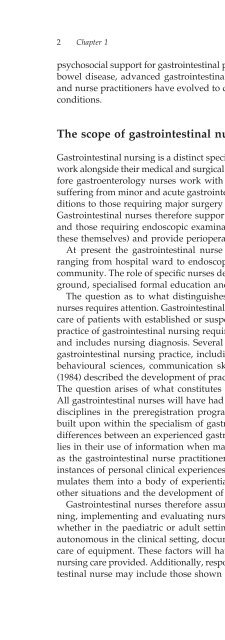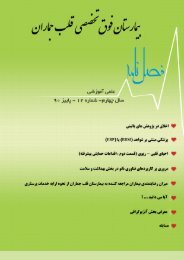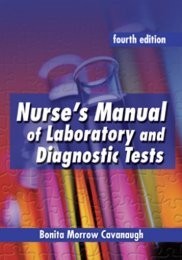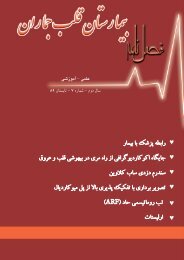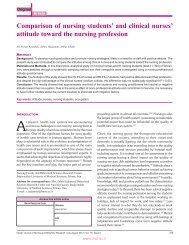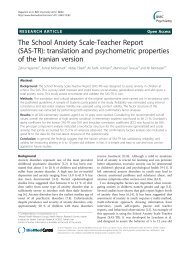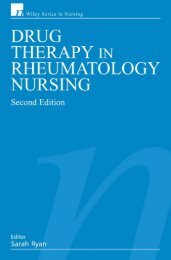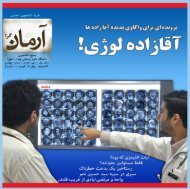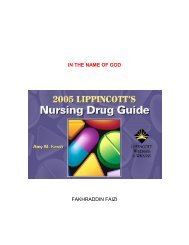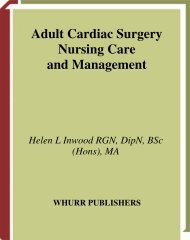Gastrointestinal Nursing.pdf
Gastrointestinal Nursing.pdf
Gastrointestinal Nursing.pdf
Create successful ePaper yourself
Turn your PDF publications into a flip-book with our unique Google optimized e-Paper software.
2 Chapter 1psychosocial support for gastrointestinal patients, in areas such as inflammatorybowel disease, advanced gastrointestinal nurse consultants, nurse specialistsand nurse practitioners have evolved to deal with holistic patient care in theseconditions.The scope of gastrointestinal nursing<strong>Gastrointestinal</strong> nursing is a distinct specialism within nursing in which nurseswork alongside their medical and surgical colleagues in gastroenterology. Thereforegastroenterology nurses work with a wide range of patients from thosesuffering from minor and acute gastrointestinal disorders through chronic conditionsto those requiring major surgery and treatment for malignant disease.<strong>Gastrointestinal</strong> nurses therefore support patients with distressing symptomsand those requiring endoscopic examination (nurses increasingly performingthese themselves) and provide perioperative support.At present the gastrointestinal nurse may work in a variety of locationsranging from hospital ward to endoscopy unit, outpatient setting and in thecommunity. The role of specific nurses depends upon their basic nursing background,specialised formal education and clinical experiences.The question as to what distinguishes a gastrointestinal nurse from othernurses requires attention. <strong>Gastrointestinal</strong> nursing can be defined as the nursingcare of patients with established or suspected gastrointestinal conditions. Thepractice of gastrointestinal nursing requires application of the nursing processand includes nursing diagnosis. Several disciplines contribute to the basis ofgastrointestinal nursing practice, including biological sciences, microbiology,behavioural sciences, communication skills and ethics. The work of Benner(1984) described the development of practice from novice to expert in nursing.The question arises of what constitutes expertise in gastrointestinal nursing.All gastrointestinal nurses will have had a grounding in the above-mentioneddisciplines in the preregistration programmes and it is this platform that isbuilt upon within the specialism of gastrointestinal nursing. One of the maindifferences between an experienced gastrointestinal nurse and a general nurselies in their use of information when making judgements. Expertise developsas the gastrointestinal nurse practitioner begins to accumulate many similarinstances of personal clinical experiences about particular care issues and formulatesthem into a body of experiential knowledge that is generalisable toother situations and the development of evidence-based practice.<strong>Gastrointestinal</strong> nurses therefore assume responsibility for assessing, planning,implementing and evaluating nursing care for gastrointestinal patients,whether in the paediatric or adult setting. Generally, they are professionallyautonomous in the clinical setting, documentation, teaching and research andcare of equipment. These factors will have a direct effect upon the quality ofnursing care provided. Additionally, responsibilities of the present-day gastrointestinalnurse may include those shown in Box 1.1.


